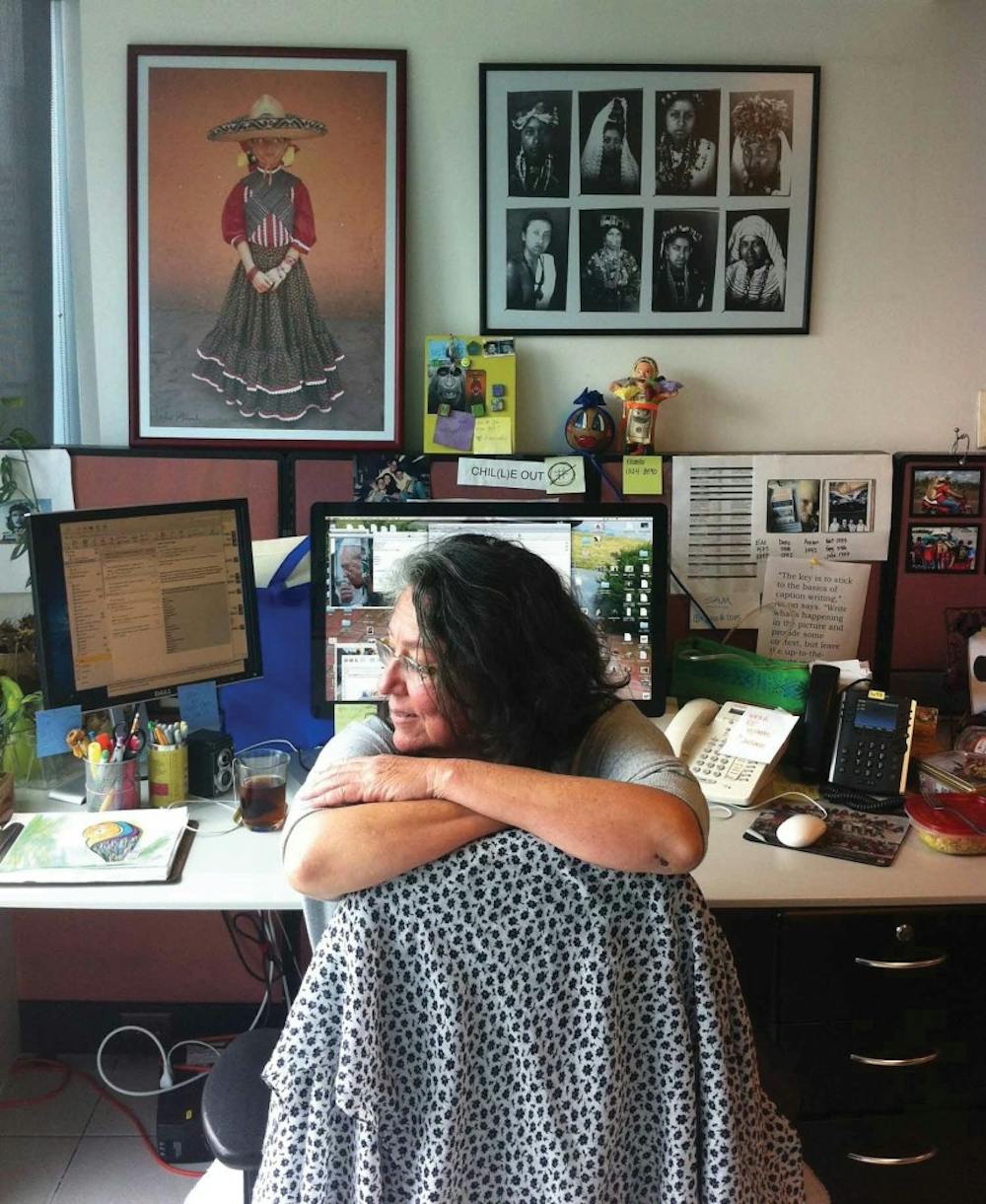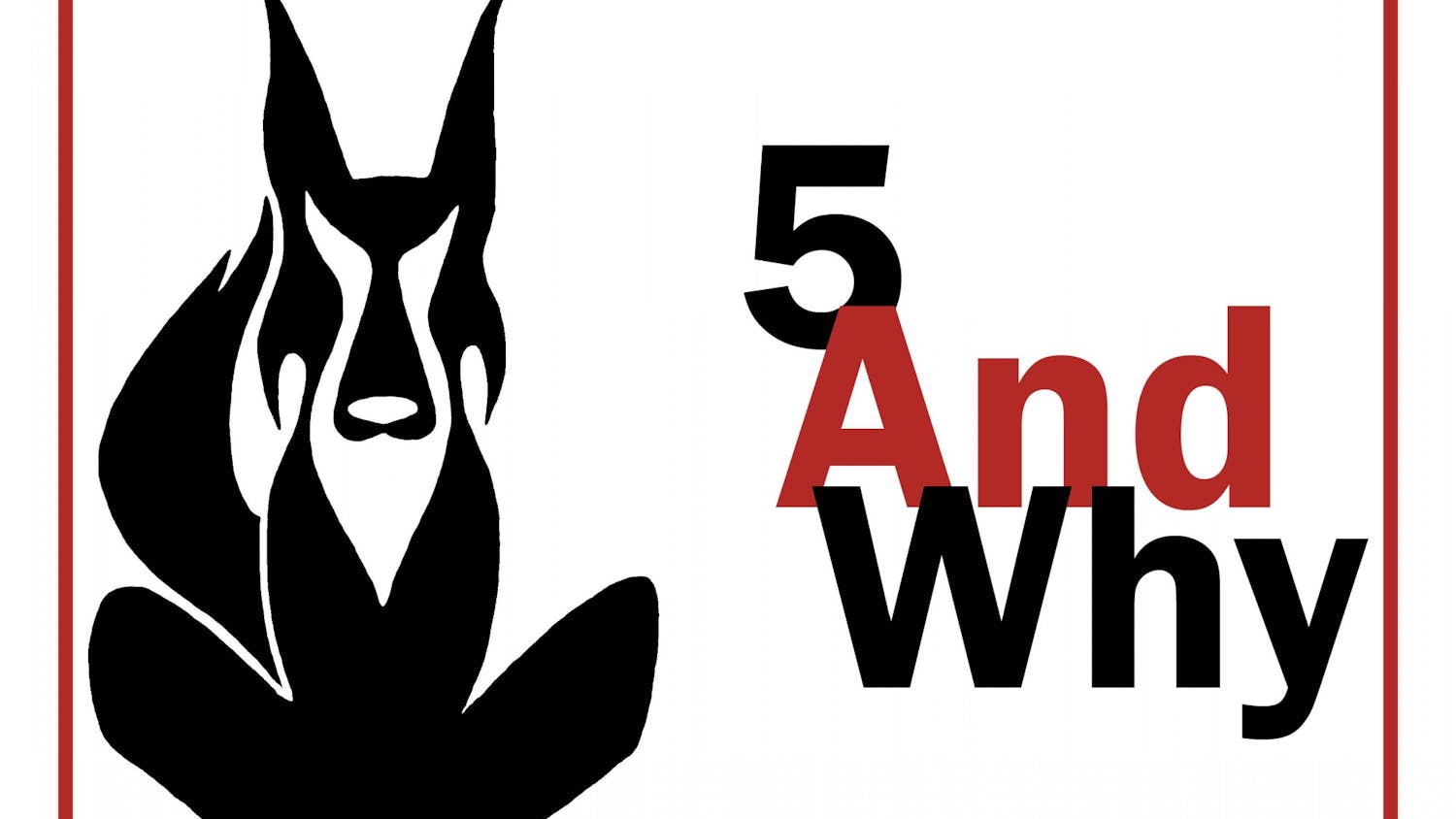Editor’s Note: This is part of a series of alumni profiles of former Daily Lobo contributors, created in an effort to connect current readers and contributors to the past and present. Continue to follow the Daily Lobo for more.
The original article stated Anita Baca worked at the San Jose Mercury News for 12 years. That is incorrect and has been updated to read, San Antonio Express-News. KayLynn Deveney's surname was also misspelled in some areas. That has also been corrected. The Daily Lobo apologizes for any confusion.
Anita Baca paid her way through earning her bachelor’s in liberal arts at the University of New Mexico in the 1980s by working in restaurants and later working as a weekend photographer at the Albuquerque Tribune. She also earned a little money on the side by working as a freelance photographer, staff photographer and photo editor at the Daily Lobo.
By working at the Tribune and the Lobo, Baca said she learned “there are so many elements telling a story and so many voices, and you have to appreciate other people’s talents — the writers, the photographers, the graphic designers. Everyone has a piece. I learned that I always thought photography was the most important piece, and that taught me to appreciate other people’s talents in the journalism business...All those people contribute to a successful report.”
Baca said although the staff was small, the Albuquerque Tribune was one of the best photo papers in the country.
Joe Cavaretta was one of her mentors at the Tribune, Baca said. He later landed a job at the Associated Press and called the Tribune one day, looking for KayLynn Deveney, Ph.D., asking her if she would be able to go to Panama for a job there. But Deveney thought Baca would be a better choice, because Baca’s first language was Spanish.
Deveney said she met Baca through a photography class at UNM. They later went to a conference and worked at the Tribune together — they became good friends. Deveney also worked at the Daily Lobo for a short time with Baca.
She said Baca is a “talented photographer (with) a very natural eye.”
“It was obvious that she was gifted with this vision, because she was a very very good photographer from the time that she started making photographs,” Deveney said.
After applying and being told she was not going to have the position, the AP called Baca back and said she would be able to be part of their team after all, Baca said.
“When I stepped off the plane (in Panama), it was completely different from anything I’d ever experienced,” she said, adding that she had never been out of the country before.
Baca stayed in Panama for two years and was able to travel easily on AP assignment to Haiti, Cuba, the Dominican Republic, Guatemala and elsewhere, she said.
Get content from The Daily Lobo delivered to your inbox
“With AP, you just hit the ground running. (Working with AP) completely changed my worldview,” she said, adding that she covered pieces about elections, protests with tear gas and other topics.
Meeting people from around the world changed her U.S.-centric perspective, as she learned about different art, music and cultures overall, Baca said.
She was transferred to Nicaragua for about seven years when her daughter was born, but she was spending very little time with her daughter, due to her work schedule, Baca said. However, she was able to switch to a different shift by working at the San Antonio Express-News for 12 years, which made spending time with her daughter easier.
Baca later transitioned to her current job in Mexico City as the photo editor for the AP Latin American desk. Although her daughter was not particularly happy about the move, she later accepted it, became bilingual and was happy it happened, Baca said, adding that her daughter had similar eye-opening experiences about cross-cultural moments to those she did.
“(Living in another place) opens up your mind in a way you cannot imagine,” Baca said.
The news that comes out of Mexico is primarily negative and fear-inducing — although there are negative things happening there, negative things can happen anywhere, she said.
Though many were fearful for her safety when she announced she would be living in Mexico City, Baca said her life there is great.
“I have everything I need,” she said.
Baca said she feels fortunate to have learned so much about the world, met so many people and walk into the office every day and meet someone new, even if that meeting is through a photo. She said she is constantly reminded that there are people who are suffering or doing great things in the world.
“It’s a great way not to lose touch, not to live in a bubble,” she said. “I think, maybe, what I love most about this job is: even though I miss meeting the people I photograph...I still vicariously am able to do that. And that’s pretty extraordinary.”
Deveney said Baca is able to see light well and use it to make poignant photographs.
She also said she remembers that Baca usually takes 25 percent of the frames others might take on assignment and does not make photos until she is satisfied with them.
“She stands back and doesn’t overshoot, (which) makes it easier for the people she’s photographing...And so they give her access to more intimate parts of their lives,” Deveney said.
Deveney said Baca is generous, attuned, loyal, funny, honest, optimistic and “tries to do good in this world for other people.”
“I think she approaches each day as if everything is going to go really well, and it’s going to be a really happy day. I think she fulfills her own destiny by starting out with a perspective like that,” Deveney said.
Ultimately, “she’s just a good person and a great friend,” Deveney said.
“Everyone seems to think going into journalism is not the best idea in the world, but I still haven’t bought that argument,” Baca said.
Elizabeth Sanchez made final edits to the English and Spanish translations. She is the editor-in-chief at the Daily Lobo and can be contacted at editorinchief@dailylobo.com or on Twitter @Beth_A_Sanchez.
____________________________________________________________________________
Nota del editor: Este es parte de una serie de perfiles de ex-alumnos de pasados colaboradores del Daily Lobo, como parte de un esfuerzo para conectar a los lectores y colaboradores actuales del pasado y presente.
Anita Baca pagó su su camino a través de ganar su licenciatura en artes liberales por la Universidad de Nuevo México en los años 1980s por trabajando en restaurantes y después trabajando como fotógrafa en los fines de semana en el Albuquerque Tribune. Ella también ganó un poco de dinero trabajando como una fotógrafa freelance, fotógrafa de personal y editora de fotos en el Daily Lobo.
Al trabajar en el Tribune y el Lobo, Baca dijo que aprendió "hay tantos elementos contando una historia y tantas voces, y usted tiene que apreciar los talentos de otras personas — los escritores, los fotógrafos, los diseñadores gráficos. Todos tienen una pieza. Aprendí que siempre pensé que la fotografía era la pieza más importante, y que me enseñó a apreciar los talentos de otras personas en el negocio del periodismo...Todas esas personas contribuyen a un informe exitoso".
Baca dijo que aunque el personal era pequeño, el Albuquerque Tribune fue uno de los mejores periódicos de foto en el país.
Joe Cavaretta fue uno de sus mentores en el Tribune, dijo Baca. Más tarde, él consiguió un trabajo en el Associated Press y un día llamó a el Tribune, en busca de KayLynn Deveney, Ph.D., preguntándole si ella sería capaz de ir a Panamá para un trabajo allí. Pero Deveney pensó que Baca sería una mejor opción, porque la primera lengua de Baca era español.
Deveney dijo que conoció a Baca a través de una clase de fotografía en UNM. Más tarde fueron a una conferencia y trabajaron juntas en el Tribune — se volvieron buenas amigas. Deveney también trabajó en el Daily Lobo por un corto tiempo con Baca.
Ella dijo que Baca es una "fotógrafa talentosa (con) un ojo muy natural”.
"Era obvio que ella era dotada con esta visión, porque ella era una fotógrafa muy muy buena de la época que ella comenzó a hacer las fotografías", dijo Deveney.
Después de que ella aplicó y le dijeron que no iba a tener la posición, el AP llamó a Baca otra vez y le dijeron que sería capaz de ser parte de su equipo al fin de todo, dijo Baca.
"Cuando bajé del avión (en Panamá), era completamente diferente de todo lo que había experimentado", dijo, y agregó que nunca había estado fuera del país.
Baca permaneció en Panamá por dos años y fue capaz de viajar fácilmente en la asignación de AP a Haití, Cuba, la República Dominicana, Guatemala y otros lugares, dijo.
"Con AP, usted acaba de golpear el suelo corriendo. (Trabajando con AP) cambió completamente mi cosmovisión", dijo, añadiendo que cubría piezas sobre elecciones, protestas con gases lacrimógenos y otras temas.
Conociendo gente de todo el mundo cambió su perspectiva centrada de los Estados Unidos, mientras aprendía sobre arte, música y culturas diferentes en general, dijo Baca.
Ella fue transferida a Nicaragua por cerca de siete años cuando su hija nació, pero ella pasaba muy poco tiempo con su hija, debido a su horario de trabajo, dijo Baca. Sin embargo, ella fue capaz de cambiar a un horario diferente trabajando en el San Antonio Express-News durante 12 años, que la hizo pasar tiempo con su hija más fácil.
Baca más tarde hizo una transición a su trabajo actual en la ciudad de México como la editora de fotos para el escritorio Latinoamericano de AP. Aunque su hija no estaba particularmente contenta con el movimiento, más tarde la aceptó, se convirtió en bilingüe y se alegró de que sucediera, dijo Baca, añadiendo que su hija tenía experiencias similares de apertura de los ojos sobre los momentos transculturales a los que ella hizo.
"(Viviendo en otro lugar) abre su mente de una manera que no se puede imaginar", dijo Baca.
La noticia que sale de México es principalmente negativa y induce miedo — aunque hay cosas negativas sucediendo allí, cosas negativas pueden suceder dondequiera, ella dijo.
Aunque muchos temían por su seguridad cuando anunció que estaría viviendo en la ciudad de México, Baca dijo que su vida allí es grandiosa.
"Tengo todo lo que necesito", dijo.
Baca dijo que se siente afortunada de haber aprendido tanto del mundo, conocer a mucha gente y de entrar a la oficina todos los días y conocer a alguien nuevo, incluso si esa reunión es a través de una foto. Ella dijo que constantemente se recuerda que hay personas que están sufriendo o haciendo grandes cosas en el mundo.
"Es una gran manera de no perder el contacto, no vivir en una burbuja", dijo. "Creo que, tal vez, lo que más me gusta de este trabajo es: a pesar de que extraño conocer a la gente que fotografío... Sigo siendo indirectamente capaz de hacer eso. Y eso es bastante extraordinario.”
Deveney dijo que Baca es capaz de ver la luz bien y usarla para hacer fotografías conmovedoras.
Ella también dijo que recuerda que Baca toma generalmente 25 por ciento de las fotogramas que otros podrían tomar en la asignación, y no hace fotos hasta que ella está satisfecha con ellos.
"Ella se aleja y no (hace más que necesario que) le hace más fácil para las personas que está fotografiando...y así le dan acceso a más partes íntimas de sus vidas", dijo Deveney.
Deveney dijo que Baca es generosa, sintoniza, leal, divertida, honesta, optimista y "intenta hacer el bien en este mundo para otras personas".
"Creo que se acerca cada día como si todo va a ir muy bien, y va a ser un día muy feliz. Creo que ella cumple su propio destino al comenzar con una perspectiva como esa", dijo Deveney.
En última instancia, "ella es sólamente una buena persona y una gran amiga", dijo Deveny.
"Todo el mundo parece pensar que entrar en el periodismo no es la mejor idea en el mundo, pero todavía no he comprado ese argumento", dijo Baca.
Elizabeth Sanchez hizo las correcciones finales a las traducciones en inglés y español. Ella es la editora-en-jefe del Daily Lobo. Puede ser contactada en editorinchief@dailylobo.com por en Twitter @Beth_A_Sanchez.






